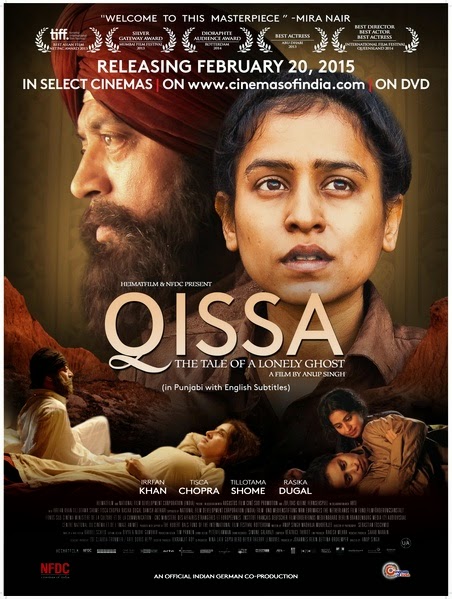Release date (India):
|
February 20, 2015
|
Director:
|
Anup Singh
|
Cast:
Language:
|
Irrfan Khan,
Tisca Chopra, Tillotama Shome, Rasika Dugal
Punjabi (with English subtitles)
|
Qissa is a film of simmering intensity that at no point descends
into high-decibel histrionics and screeching music. Great stories don’t require
such crutches when drama is intrinsic to the situations they are relating to us
and does not need to be hammered into our heads.
Anup Singh’s film is set
in Partition-time Punjab but is imbued with a sense of timelessness that is
almost tragic: it feels like it could well be happening in 2015.
This is the story of Umber
Singh and his family who cross over into India to escape the violence dogging
their people on the other side of the border. Umber is troubled by greater
concerns than possible bloodshed though; he is hurting because his wife has
given birth to three daughters in succession. He neither sees her pain at his
atittude towards their girls, nor does he care. When the fourth daughter is
born, Umber decides to bring her up as a son called Kanwar.
Qissa: The Tale of a Lonely Ghost then is about the
craving for sons that is the curse of so many societies across the world and the
manner in which that craving manifests itself in the subcontinent, but it is so
much more. It is about gender confusion, about forbidden love, about being what
you want to be, about daughters who are almost like figures unseen by their
father in the house, about a ‘son’ whose reality is treated like a spectre to
be ignored by his/her father and about the lengths to which human beings could
go to keep their guilty secrets hidden.
Where the film is
dealing with these issues, it is poignant and convincing. In the second half
though, with the death of a character and the advent of a ghost, the tone
changes as the narrative enters a realm where the metaphysical and the
philosophical converge. Is the apparition intended to represent the ghost of
patriarchy which continues to hover around the proceedings (as one of my
friends insists) or the inner conflicts that continue to haunt Kanwar (my
interpretation) even when life and love have in a sense liberated her/him? I
can’t say. Unfortunately, this departure from the realistic nature of the
preceding account makes a significant portion of the film too dense and robs it of some of its impact.
All is definitely not
lost though because Qissa – a name
that somehow implies folklore and legend – is at its very core a compelling
tale enacted by a powerful cast.
The formidable Irrfan
Khan’s performance here is different from much of what we’ve seen him do
before. He plays Umber with a deadpan face but a voice brimming with things
left unsaid. One of my favourite scenes in Qissa
has him grabbing his last child before his wife can see it and announcing the
birth – at last – of a son. It is a chilling moment in which his demeanour
reveals that he’s not just deceiving his spouse, he is determined to deceive
himself too.
In an extremely
challenging role that might have been overplayed by a lesser actor, Tillotama Shome
is remarkable – and remarkably understated – as Kanwar. It’s hard to forget the
despair in her voice when she asks her mother: why did you not protect me like
you protected the others?
This is a film filled
with good performances, yet there are two that stood out: one from a
little-known youngster and another from an actress who gained a high profile with
Aamir Khan’s Taare Zameen Par in 2007.
Tisca Chopra as Kanwar’s mother delivers a heartfelt performance that could touch
even the most unfeeling among us. So does Rasika Dugal playing Neeli, who is married
off to a woman she thinks is a man. Her striking screen presence and natural
ease before the camera make her a performer to watch out for. That scene in
which Neeli and Kanwar discuss their innermost feelings in a darkened room away
from the vigilant Umber is one of the sweetest interactions between two women
I’ve seen on the Indian screen, and it is what it is because of strong writing
bolstered by lovely acting.
The other joy of
watching Qissa is in listening to the
Punjabi spoken so naturally by the film’s cast, not all of whom are Punjabis in
real life. There is a lilt and cadence to their rendering of the language that
is so pleasing to the ear, especially for those of us who are tired of the Punjabi
stereotype that dominates contemporary Hindi cinema.
If you were to go by
Bollywood portrayals, then you have to believe that all Punjabis, especially
Sikh Punjabis, are loud, brash, boisterous, high-strung, easily-riled people
who do the bhangra and say “Balle balle”
at the drop of a hat. In fact, after Indian Christians who suffered persistent
– and often harmful – stereotyping up to the 1990s (the community has virtually
disappeared from Bollywood stories since that decade), the ones who have been
most consistently targeted by Hindi film makers are Punjabis and Sikhs. Away
from the silliness and lazy writing that too often rules mainstream Bollywood,
comes this quiet multi-national co-production.
Qissa loses its way somewhat in the second half, but for the most
part it hits the bull’s eye as a silent and desperate plea for the Kanwars of
our world. This is a moving, well-acted film that compels us to think, and for
that, thank you Mr Singh.
Rating (out of five): **3/4
CBFC Rating (India):
|
A
|
Running time:
|
135 minutes
|

No comments:
Post a Comment